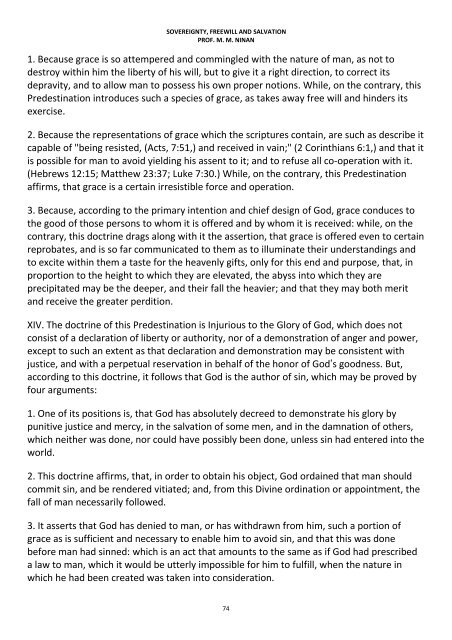Calvinism and Arminianism
Create successful ePaper yourself
Turn your PDF publications into a flip-book with our unique Google optimized e-Paper software.
SOVEREIGNTY, FREEWILL AND SALVATION<br />
PROF. M. M. NINAN<br />
1. Because grace is so attempered <strong>and</strong> commingled with the nature of man, as not to<br />
destroy within him the liberty of his will, but to give it a right direction, to correct its<br />
depravity, <strong>and</strong> to allow man to possess his own proper notions. While, on the contrary, this<br />
Predestination introduces such a species of grace, as takes away free will <strong>and</strong> hinders its<br />
exercise.<br />
2. Because the representations of grace which the scriptures contain, are such as describe it<br />
capable of "being resisted, (Acts, 7:51,) <strong>and</strong> received in vain;" (2 Corinthians 6:1,) <strong>and</strong> that it<br />
is possible for man to avoid yielding his assent to it; <strong>and</strong> to refuse all co-operation with it.<br />
(Hebrews 12:15; Matthew 23:37; Luke 7:30.) While, on the contrary, this Predestination<br />
affirms, that grace is a certain irresistible force <strong>and</strong> operation.<br />
3. Because, according to the primary intention <strong>and</strong> chief design of God, grace conduces to<br />
the good of those persons to whom it is offered <strong>and</strong> by whom it is received: while, on the<br />
contrary, this doctrine drags along with it the assertion, that grace is offered even to certain<br />
reprobates, <strong>and</strong> is so far communicated to them as to illuminate their underst<strong>and</strong>ings <strong>and</strong><br />
to excite within them a taste for the heavenly gifts, only for this end <strong>and</strong> purpose, that, in<br />
proportion to the height to which they are elevated, the abyss into which they are<br />
precipitated may be the deeper, <strong>and</strong> their fall the heavier; <strong>and</strong> that they may both merit<br />
<strong>and</strong> receive the greater perdition.<br />
XIV. The doctrine of this Predestination is Injurious to the Glory of God, which does not<br />
consist of a declaration of liberty or authority, nor of a demonstration of anger <strong>and</strong> power,<br />
except to such an extent as that declaration <strong>and</strong> demonstration may be consistent with<br />
justice, <strong>and</strong> with a perpetual reservation in behalf of the honor of God’s goodness. But,<br />
according to this doctrine, it follows that God is the author of sin, which may be proved by<br />
four arguments:<br />
1. One of its positions is, that God has absolutely decreed to demonstrate his glory by<br />
punitive justice <strong>and</strong> mercy, in the salvation of some men, <strong>and</strong> in the damnation of others,<br />
which neither was done, nor could have possibly been done, unless sin had entered into the<br />
world.<br />
2. This doctrine affirms, that, in order to obtain his object, God ordained that man should<br />
commit sin, <strong>and</strong> be rendered vitiated; <strong>and</strong>, from this Divine ordination or appointment, the<br />
fall of man necessarily followed.<br />
3. It asserts that God has denied to man, or has withdrawn from him, such a portion of<br />
grace as is sufficient <strong>and</strong> necessary to enable him to avoid sin, <strong>and</strong> that this was done<br />
before man had sinned: which is an act that amounts to the same as if God had prescribed<br />
a law to man, which it would be utterly impossible for him to fulfill, when the nature in<br />
which he had been created was taken into consideration.<br />
74

















